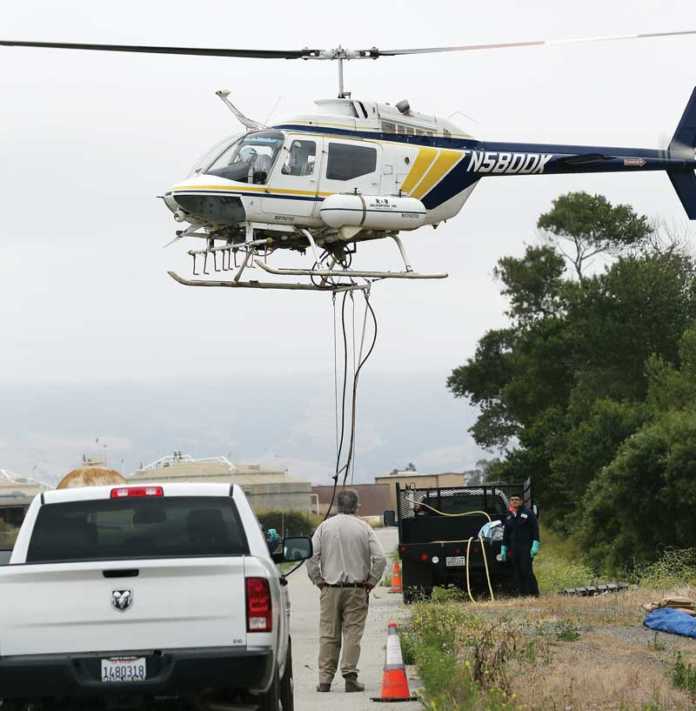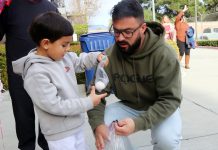(A helicopter working with Santa Cruz County Mosquito and Vector Control loads up on mosquito control granules Wednesday on the Pajaro River levee. Photo byTarmo Hannula/Pajaronian)
WATSONVILLE — Watsonville was visited by a helicopter Wednesday as it deposited mosquito control granules to 40 acres of local marshes. The project, started at 8 a.m. and included portions of Watsonville Slough, Pinto Lake County Park, Sunset State Beach pond and Atkinson pond, said Paul Binding, manager of Santa Cruz County Mosquito Abatement/Vector Control.
The outcome of the treatment will be a reduction in the number of pestiferous mosquitoes that emerge from the shallows of those wetlands. The treatment involves directed granular treatment and not aerial fogging or an air dispersed application.
The mosquito control granules are derived from biological microbials, Bacillus thuringiensis israelensis and Bacillus sphaericus on corncob granules; also methoprene, a mosquito-specific growth regulator that mimics the larvae’s own juvenile hormone. These products target immature mosquitoes (aquatic stages).
This application will prevent the emergence of adult mosquitoes and is not harmful to humans, birds, fish or other wildlife, according to Binding. By controlling mosquitoes in the larval stage, dispersal of adult mosquitoes into the community is minimized and the need to use less selective control measures such as fogging for adult mosquitoes is significantly reduced, he said.
“These treatments are necessary because warm weather species of mosquitoes are hatching from aquatic larvae in significant numbers, particularly in the stagnant muck among dense vegetation,” Binding said.
A larval control effort provides relief from bites and is important for the prevention of mosquito-borne diseases, including West Nile Virus. The targeted application of granules by helicopter is a proven method of controlling larvae, which has successfully been used since 1993, Binding said.
Officials encourage residents to empty yard containers of standing water; wear long sleeved shirts, pants, socks with shoes and repellants when outside at dawn or dusk; and place mosquitofish in ornamental ponds or non-maintained pools. Residents are also asked to inform Santa Cruz County Mosquito Abatement/Vector Control of mosquito breeding situations such as unmaintained swimming pools or ponds and of biting mosquitoes at 454-2590.
Officials also encourage reporting dead birds to the Department of Public Health – West Nile Virus hotline, 1-877-WNV-BIRD, or on their website, www.westnile.ca.gov, as these reports can help locate West Nile Virus activity.











